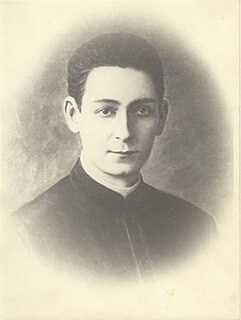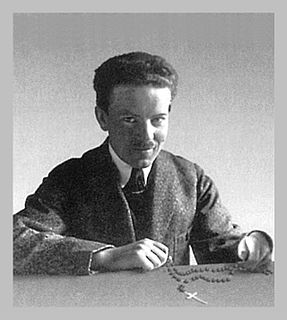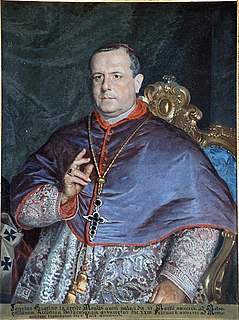Related Research Articles
Stephen Ferrando was an Italian Roman Catholic priest belonging to the Salesians of Don Bosco – an order that Saint John Bosco established. He served in the missions in Asia once he was ordained and was stationed in India where he led a diocese of his own. He also established his own religious congregation.

August Franciszek Maria Anna Józef Kajetan Czartoryski was a Polish Roman Catholic professed member of the Salesians of Don Bosco and a noble prince. He was born in Paris during his house's exile and came from a notable house; his constant frail health saw much of his childhood being shuttled to various health spas. Raphael Kalinowski tutored him; the prince turned to the priesthood instead of pursuing the aristocratic life.

Michele Rua was an Italian Roman Catholic priest and professed member of the Salesians of Don Bosco. Rua was a student under Don Bosco and was also the latter's first collaborator in the order's founding as well as one of his closest friends. He served as the first Rector Major of the Salesians following Bosco's death in 1888. He was responsible for the expansion of the Salesians and the order had grown to a significant degree around the world at the time he died. Rua served as a noted spiritual director and leader for the Salesians known for his austerities and rigid adherence to the rule. It was for this reason that he was nicknamed, 'the living rule'.

Jan Leopold Tyranowski was a Polish Roman Catholic. He was an ardent admirer and follower of the Discalced Carmelite charism – but was not of their order – and was a central figure in the spiritual formation of Karol Józef Wojtyła who became Pope John Paul II. He was both the leader and student mentor of his friend's college parish of Saint Stanisław Kostka in the 1940s as well as a small group he ran on the behalf of the Salesians of Don Bosco during the wartime period.
Giovanni Battista Scalabrini was an Italian Roman Catholic prelate and the Bishop of Piacenza from 1876 until his death; he was the founder of both the Missionaries of Saint Charles and the Mission Sisters of Saint Charles. Scalabrini's rise to the episcopate came at a rapid pace after giving a series of lectures on the First Vatican Council in 1872 and his staunch dedication to catechism which led Pope Pius IX to dub him as the "Apostle of the Catechism"; successive popes Leo XIII and Pius X held him in incredible esteem and both failed to convince him accept archdioceses or the cardinalate. He made five pastoral visits across his diocese which proved to be an exhaustive but effective mission of evangelization and his efforts at reforming seminaries and pastoral initiatives earned him praise even from the secular detractors who criticized him for his strict obedience to the pope.

Franz Josef Rudigier was an Austrian Roman Catholic prelate and served as the Bishop of Linz from his appointment in 1853 until his death. Much of his local diocese grew due to his vigorous in promoting evangelic zeal and fundamental religious principles. His deep faith and will made him the intellectual figurehead of prelates in their struggle with liberalism.

Eusebia Palomino Yenes was a Spanish Roman Catholic professed religious and a professed member from the Salesian Sisters of Don Bosco. Palomino worked as a domestic in her adolescence having withdrawn from her education in order to support her parents though she later worked with the Salesian Sisters before she began the process of becoming a religious of that order in the 1920s; she afterwards continued most of the same duties and became known for her devotion to the five wounds of Jesus Christ and to the Via Crucis.
José Vandor Puchner – born as József Wech – was a Hungarian Roman Catholic priest and a professed member from the Salesians of Don Bosco. He served in the missions on the island nation of Cuba where he was stationed from 1936 until his death but spent the bulk of that time in Santa Clara where he was since 1954.

Giuseppe Guarino was an Italian Roman Catholic prelate and cardinal who served as the Archbishop of Messina from 1875 until his death. He was also the founder of the Apostoli della Sacra Famiglia. Guarino dedicated himself to proper religious formation for both priests and nuns while serving in both Siracusa and Messina and was known for reigniting the faith in those who were considered cut off from the faith.
Filippo Rinaldi was an Italian Roman Catholic priest and a professed member from the Salesians of Don Bosco; he served as the third Rector Major for the order from 1922 until his death in 1931. He founded the Secular Institute of Don Bosco Volunteers. Rinaldi was close friends since his childhood to Giovanni Bosco and Paolo Albera and it was Bosco who guided Rinaldi who was torn in his adolescence between the farming life and the religious life. The order held him in high esteem from the outset and noted the potential within him as well as seeing the charism of Bosco encompassed in Rinaldi.

Giacinto Bonaventura Longhin - in religious Andrea di Campodarsego - was an Italian Roman Catholic prelate and professed member from the Order of Friars Minor Capuchin who served as the Bishop of Treviso from 1904 until his death. Longhin held various roles of leadership within his order following his ordination such as acting as a teacher in Udine and acting as the Provincial Minister for his order. He became close friends with the Patriarch of Venice Giuseppe Melchiorre Sarto. The latter became Pope Pius X in 1903 who made his old friend Longhin the new head for the vacant Treviso episcopal see.
Blessed Edoardo Giuseppe Rosaz was an Italian Roman Catholic prelate who served as the Bishop of Susa from 1877 until his death and was the founder of the Franciscan Mission Sisters of Susa. He served as a simple priest before his episcopal appointment was announced - at Saint Giovanni Bosco's suggestion - and his apostolic zeal became even greater as a bishop when he tended to abandoned people in the peripheries and encouraged the work of a range of different religious orders.
Maximiano Valdés Subercaseaux - in religious Francisco - was a Chilean Roman Catholic prelate who was a professed member from the Order of Friars Minor Capuchin and served as the first Bishop of Osorno from 1956 until his death. Valdés discerned his call to the priesthood while with his parents in Europe and was ordained as a priest in Venice after completing his studies in Rome but continued further formation amongst the Franciscans in Europe before making his return to Chile. He was the first Chilean to have become a Capuchin friar. Valdés dedicated his episcopal career to the poor and he often visited the poor regions around his diocese while remaining a staunch advocate for a peaceful resolution to the Chile-Argentina border disputes; his last words also contained a desire for there to be peace between the two feuding nations.

Luigi Variara was an Italian Roman Catholic priest and a professed member of the Salesians of Don Bosco. He served for most of his life as part of the missions in Colombia where he worked with lepers and the children of outcast lepers. He was ordained as a priest while serving there and made it his mission to provide both relief and consolation.

Bronisław Markiewicz was a Polish Roman Catholic priest and a professed member of the Salesians of Don Bosco. Markiewicz established the Congregation of Saint Michael the Archangel that devoted itself to the principles and teachings of John Bosco as well as the figure of Saint Michael the Archangel.
Octavio Ortiz Arrieta was a Peruvian Roman Catholic Church prelate and a professed member of the Salesians of Don Bosco who served as the Bishop of Chachapoyas from 1921 until his death. Arrieta first studied to become a carpenter at a Salesian-run school but soon decided to become a priest with the order to which he was professed in 1902. He served at several Salesian houses for over the next decade until Pope Benedict XV appointed him as a bishop in late 1921. He was a prolific shepherd of souls; he underwent eight pastoral visitations to all his parishes and travelled far and wide to meet with his people and to launch a range of pastoral initiatives designed to rekindle the faith of the population.

Luigi Versiglia, S.D.B. was an Italian Roman Catholic prelate and professed member from the Salesians of Don Bosco who served as the first Apostolic Vicar of Shaoguan from 1920 until his murder. He was also a former novice master noted for his strict austerities and discipline but for his loving and compassionate care of the poor and defenceless. He led the first Salesian expedition to China in 1906 and remained there until his death functioning for the people in various capacities such as a gardener and barber.
Oreste Marengo was an Italian Roman Catholic prelate and professed member from the Salesians of Don Bosco. He served as the Bishop of Diburugarh from 1951 until his transferral in 1964 to Tezpur where he served until 1969. From that point until 1979 he served as the apostolic administrator for the new Tura see. He was dedicated since his childhood to joining the missions and in his late adolescence was permitted to go to the missions in India. Marengo often trekked on foot to remote villages where he evangelized to the people and provided for their educational needs as best he could. He was reluctant to accept his episcopal nomination but did not cease his catechizing and evangelizing in his dioceses. His time spent in India saw him learn prior to his ordination under the Venerable Stefano Ferrando and the Servant of God Costantino Vendrame.

Francesco Convertini was an Italian Roman Catholic priest and professed member from the Salesians of Don Bosco. He served in the missions in India since arriving there in the mid-1920s and dedicated his apostolate to tending to children suffering from malnutrition and fostering interreligious dialogue and tolerance. He also dedicated himself to preserving the environmental protection of local communities in waste-ridden areas and travelled to various communities to bring forth the Gospel message to all people.
Attilio Giordani was an Italian Roman Catholic and member from the Association of Salesian Cooperators. Giordani studied in Milan where he encountered the Salesians of Don Bosco alongside his brother Camillo. His brother was inspired to become a priest while Giordani was inspired to become a catechist and evangelist catering to the needs of the local children and adolescents. His work at a Salesian-managed oratorio was where he would meet his future wife during the time he did mandated service with the Italian armed forces during World War II. He had three children and followed them to Brazil to do volunteer work in the missions there. His time there was short-lived as he died suffering a heart attack while giving an address to a crowd.
References
- 1 2 3 4 5 6 "Servant of God Augusto Bertazzoni". Santi e Beati. Retrieved 29 September 2015.
- ↑ "Archbishop Augusto Bertazzoni". Catholic Hierarchy. Retrieved 22 September 2015.
- ↑ "Mons. Bertazzoni, 2019 esame dei teologi". Basilicata. 6 February 2018. Retrieved 24 February 2018.